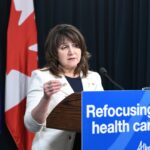In an unprecedented recruitment effort, British Columbia has unveiled an ambitious advertising campaign targeting frustrated American healthcare professionals, offering them a fresh start in Canada’s westernmost province. The initiative, spearheaded by Health Minister Adrian Dix, represents a strategic pivot in addressing BC’s critical healthcare staffing shortages through international recruitment.
The campaign’s messaging is unapologetically direct: “Your politics got you down? Come practice in BC.” This appeal strikes at growing professional dissatisfaction among U.S. healthcare workers, particularly in states where reproductive rights and LGBTQ+ healthcare have faced increasing restrictions.
“We’re offering American healthcare professionals something many desperately want – the freedom to practice medicine according to best evidence and their professional judgment,” Dix explained at yesterday’s launch event in Vancouver. “In British Columbia, clinical decisions remain between providers and patients, without political interference.”
The multi-platform initiative includes targeted digital advertising across social media, professional networks, and specialized healthcare publications. According to ministry officials, the campaign will focus on regions where political and regulatory climates have created challenging practice environments for healthcare providers.
This recruitment drive forms part of BC’s broader healthcare workforce strategy that has already demonstrated measurable success. Since 2022, the province has registered approximately 38,000 new healthcare workers, including 14,000 nurses and 10,000 allied health professionals. The international recruitment component aims to supplement ongoing domestic training programs and retention efforts.
Healthcare policy experts note that while Canadian provinces have previously recruited internationally, BC’s direct appeal to American professionals’ professional values represents a novel approach. “This campaign smartly positions BC not just as an employer, but as a place where healthcare providers can practice according to their ethics without interference,” said Dr. Renata Milos, healthcare policy researcher at the University of British Columbia.
The timing appears strategic, coinciding with growing reports of workplace dissatisfaction among American healthcare workers. A recent survey by the American Medical Association found that 61% of physicians have experienced increased burnout since 2020, with 38% citing concerns about political interference in clinical decision-making.
BC’s healthcare system, while not without its challenges, offers potential transplants universal coverage, standardized compensation models, and significantly lower administrative burdens than the U.S. system. The province is particularly targeting family physicians, emergency medicine specialists, psychiatrists, and various nursing specialties.
Critics within Canadian political circles question whether recruiting American professionals might exacerbate healthcare inequities in the United States. However, healthcare workforce planners counter that professional mobility between countries has always existed, and BC is simply making its case as a destination of choice.
“Healthcare professionals make deeply personal choices about where to practice based on numerous factors,” said BC Nurses’ Union President Adriane Gear. “This campaign simply ensures BC is visible to those already considering a change.”
As healthcare systems worldwide grapple with staffing challenges in a post-pandemic landscape, will this bold recruitment strategy establish a new template for international healthcare worker mobility? Or will it spark a competitive response from American healthcare systems fighting to retain their valuable professionals?

























